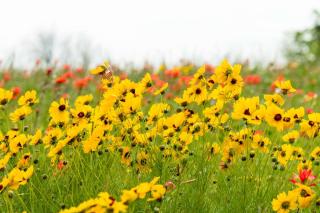

Do you want flowers without the gardening work? Want to spare yourself hours of maintenance work? Learn how to select the right, easy plants!
Start with a quick review of your flower beds, what their exposure is, type of soil (neutral, acidic, chalky), its structure (heavy or well-draining), and of course make note of the climate zone you’re in. These different parameters, which you can also determine simply by identifying which weeds are growing spontaneously in your soil, will help find out which plants are best suited to growing in your garden. They’re the ones that will have the greatest chance of thriving in it, and they won’t even need any care from you at all.
→ The ultimate solution? A wildflower garden!

For long-lasting blooming that will extend from May to October, go for perennial geranium (don’t get these confused with pelargonium which usually decorate windowsills), nepeta, coreopsis, the one or they other type of sage, yarrow, pincushion flowers, surfinia… Climbing vines like nasturtium and black-eyed Susan excel, too.
If you love roses, easiest among them are the vining roses, they bloom abundantly. Landscaping rose shrubs that don’t need any pruning or treatments against disease are another great choice. Take your pick from the varieties that various rose breeders have to offer (Meilland, David Austin…).
To reduce the risk of disease, make sure there’s enough space between your plants for air and light to circulate freely. Add ripe compost or organic fertilizer before the blooming, in March or April. In case of drought, take care to water during cooler times of the day, either in the morning or in the evening, otherwise you’ll be inviting fungus in.
If, despite your efforts, some plants do fall sick, remove diseased portions and burn them. Aphids might surprise you with a massive attack – spray any infested leaves and buds with a mix of water and beldi soap: it’s a non-polluting option that has proven its worth!
Laure Hamann
Make sure to include both perennials and self-sowing annuals. The combination looks amazing and the effort to manage both is identical: almost none!